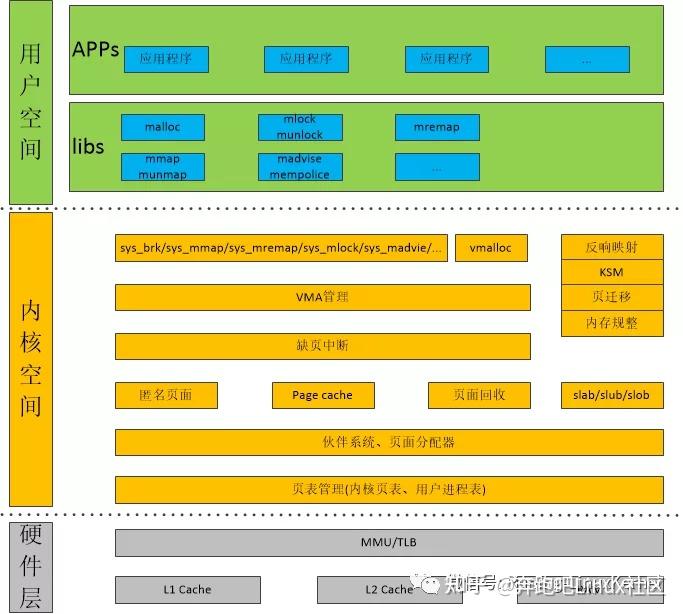- 作者:老汪软件技巧
- 发表时间:2024-10-10 07:01
- 浏览量:
本章主要讲“属性文件创建和mmap映射”,现给出完整数据流程图
上一章中讲解了上图左侧"属性安全上下文序列化",右侧部分就是“属性文件创建和mmap映射“做的工作,入口代码为__system_property_area_init
void property_init() {
mkdir("/dev/__properties__", S_IRWXU | S_IXGRP | S_IXOTH);
CreateSerializedPropertyInfo();
if (__system_property_area_init()) {
LOG(FATAL) << "Failed to initialize property area";
}
if (!property_info_area.LoadDefaultPath()) {
LOG(FATAL) << "Failed to load serialized property info file";
}
}
bionic/libc/include/sys/_system_properties.h
#define PROP_FILENAME "/dev/__properties__"
// bionic/libc/include/sys/_system_properties.h
// bionic/libc/bionic/system_property_api.cpp
__BIONIC_WEAK_FOR_NATIVE_BRIDGE
int __system_property_area_init() {
bool fsetxattr_failed = false;
return system_properties.AreaInit(PROP_FILENAME, &fsetxattr_failed) && !fsetxattr_failed ? 0 : -1;
}
可以看到__system_property_area_init是调用到system_properties.AreaInit,system_properties实际是图中SystemProperties对象,它是一个大管家对象,它又如下作用:
class SystemProperties {
public:
friend struct LocalPropertyTestState;
friend class SystemPropertiesTest;
// Note that system properties are initialized before libc calls static initializers, so
// doing any initialization in this constructor is an error. Even a Constructor that zero
// initializes this class will clobber the previous property initialization.
// We rely on the static SystemProperties in libc to be placed in .bss and zero initialized.
SystemProperties() = default;
// Special constructor for testing that also zero initializes the important members.
explicit SystemProperties(bool initialized) : initialized_(initialized) {
}
}
可见system_properties实例是由libc调用初始化的。
bool SystemProperties::AreaInit(const char* filename, bool* fsetxattr_failed) {
if (strlen(filename) >= PROP_FILENAME_MAX) {
return false;
}
strcpy(property_filename_, filename);
contexts_ = new (contexts_data_) ContextsSerialized();
if (!contexts_->Initialize(true, property_filename_, fsetxattr_failed)) {
return false;
}
initialized_ = true;
return true;
}
在AreaInit方法中又调用了ContextsSerialized->Initialize
注意:第一个参数为writable为true表示可写的,这是一个比较重要的参数
bool ContextsSerialized::Initialize(bool writable, const char* filename, bool* fsetxattr_failed) {
filename_ = filename;
if (!InitializeProperties()) {
return false;
}
if (writable) {
mkdir(filename_, S_IRWXU | S_IXGRP | S_IXOTH);
bool open_failed = false;
if (fsetxattr_failed) {
*fsetxattr_failed = false;
}
for (size_t i = 0; i < num_context_nodes_; ++i) {
if (!context_nodes_[i].Open(true, fsetxattr_failed)) {
open_failed = true;
}
}
if (open_failed || !MapSerialPropertyArea(true, fsetxattr_failed)) {
FreeAndUnmap();
return false;
}
} else {
if (!MapSerialPropertyArea(false, nullptr)) {
FreeAndUnmap();
return false;
}
}
Initialize完成了橙色框中上面部分的工作:

加载property_info
bool ContextsSerialized::InitializeProperties() {
//加载/dev/__properties__/property_info
if (!property_info_area_file_.LoadDefaultPath()) {
return false;
}
.....省略代码
return true;
}
//system/core/property_service/libpropertyinfoparser/property_info_parser.cpp
bool PropertyInfoAreaFile::LoadDefaultPath() {
return LoadPath("/dev/__properties__/property_info");
}
bool PropertyInfoAreaFile::LoadPath(const char* filename) {
int fd = open(filename, O_CLOEXEC | O_NOFOLLOW | O_RDONLY);
auto mmap_size = fd_stat.st_size;
void* map_result = mmap(nullptr, mmap_size, PROT_READ, MAP_SHARED, fd, 0);
if (map_result == MAP_FAILED) {
close(fd);
return false;
}
auto property_info_area = reinterpret_cast(map_result);
if (property_info_area->minimum_supported_version() > 1 ||
property_info_area->size() != mmap_size) {
munmap(map_result, mmap_size);
close(fd);
return false;
}
close(fd);
mmap_base_ = map_result;
mmap_size_ = mmap_size;
return true;
}
创建ContextNode数组
bool ContextsSerialized::InitializeProperties() {
.....省略代码
//创建ContextNode数组
if (!InitializeContextNodes()) {
FreeAndUnmap();
return false;
}
return true;
}
bool ContextsSerialized::InitializeContextNodes() {
auto num_context_nodes = property_info_area_file_->num_contexts();
auto context_nodes_mmap_size = sizeof(ContextNode) * num_context_nodes;
// We want to avoid malloc in system properties, so we take an anonymous map instead (b/31659220).
void* const map_result = mmap(nullptr, context_nodes_mmap_size, PROT_READ | PROT_WRITE,
MAP_PRIVATE | MAP_ANONYMOUS, -1, 0);
if (map_result == MAP_FAILED) {
return false;
}
prctl(PR_SET_VMA, PR_SET_VMA_ANON_NAME, map_result, context_nodes_mmap_size,
"System property context nodes");
context_nodes_ = reinterpret_cast(map_result);
num_context_nodes_ = num_context_nodes;
context_nodes_mmap_size_ = context_nodes_mmap_size;
for (size_t i = 0; i < num_context_nodes; ++i) {
new (&context_nodes_[i]) ContextNode(property_info_area_file_->context(i), filename_);
}
return true;
}
创建属性文件
bool ContextsSerialized::Initialize(bool writable, const char* filename, bool* fsetxattr_failed) {
.....省略代码
if (writable) {
.....省略代码
for (size_t i = 0; i < num_context_nodes_; ++i) {
if (!context_nodes_[i].Open(true, fsetxattr_failed)) {
open_failed = true;
}
}
} else {
if (!MapSerialPropertyArea(false, nullptr)) {
FreeAndUnmap();
return false;
}
}
return true;
}
循环遍历context_nodes_数组调用open方法创建属性文件
//调用
context_nodes_[i].Open(true, fsetxattr_failed)
//实现
bool ContextNode::Open(bool access_rw, bool* fsetxattr_failed) {
lock_.lock();
if (pa_) {
lock_.unlock();
return true;
}
char filename[PROP_FILENAME_MAX];
int len = async_safe_format_buffer(filename, sizeof(filename), "%s/%s", filename_, context_);
if (len < 0 || len >= PROP_FILENAME_MAX) {
lock_.unlock();
return false;
}
if (access_rw) {
pa_ = prop_area::map_prop_area_rw(filename, context_, fsetxattr_failed);
} else {
pa_ = prop_area::map_prop_area(filename);
}
lock_.unlock();
return pa_;
}
constexpr size_t PA_SIZE = 128 * 1024;
prop_area* prop_area::map_prop_area_rw(const char* filename, const char* context,
bool* fsetxattr_failed) {
/* dev is a tmpfs that we can use to carve a shared workspace
* out of, so let's do that...
*/
const int fd = open(filename, O_RDWR | O_CREAT | O_NOFOLLOW | O_CLOEXEC | O_EXCL, 0444);
if (fd < 0) {
if (errno == EACCES) {
/* for consistency with the case where the process has already
* mapped the page in and segfaults when trying to write to it
*/
abort();
}
return nullptr;
}
if (context) {
if (fsetxattr(fd, XATTR_NAME_SELINUX, context, strlen(context) + 1, 0) != 0) {
async_safe_format_log(ANDROID_LOG_ERROR, "libc",
"fsetxattr failed to set context (%s) for \"%s\"", context, filename);
/*
* fsetxattr() will fail during system properties tests due to selinux policy.
* We do not want to create a custom policy for the tester, so we will continue in
* this function but set a flag that an error has occurred.
* Init, which is the only daemon that should ever call this function will abort
* when this error occurs.
* Otherwise, the tester will ignore it and continue, albeit without any selinux
* property separation.
*/
if (fsetxattr_failed) {
*fsetxattr_failed = true;
}
}
}
if (ftruncate(fd, PA_SIZE) < 0) {
close(fd);
return nullptr;
}
pa_size_ = PA_SIZE;
pa_data_size_ = pa_size_ - sizeof(prop_area);
void* const memory_area = mmap(nullptr, pa_size_, PROT_READ | PROT_WRITE, MAP_SHARED, fd, 0);
if (memory_area == MAP_FAILED) {
close(fd);
return nullptr;
}
prop_area* pa = new (memory_area) prop_area(PROP_AREA_MAGIC, PROP_AREA_VERSION);
close(fd);
return pa;
}
prop_area->pa_size_:整个prop_area数据结构的大小(包含data[0])
prop_area->pa_data_size_:prop_area->data[0]可用最大空间
在/dev/__properties__下创建的属性文件如下
到此为止完整数据流程图中右侧的主要数据结构都构建完成,只剩下属性文件的数据了。




